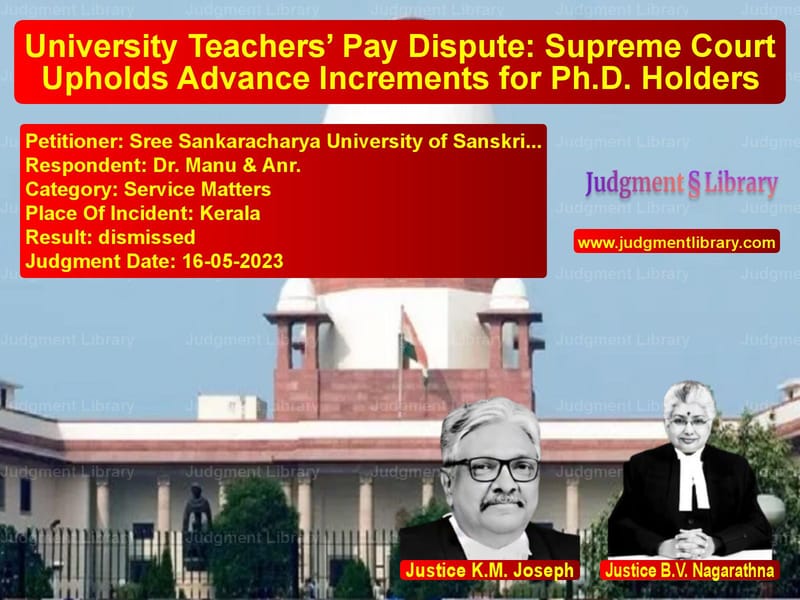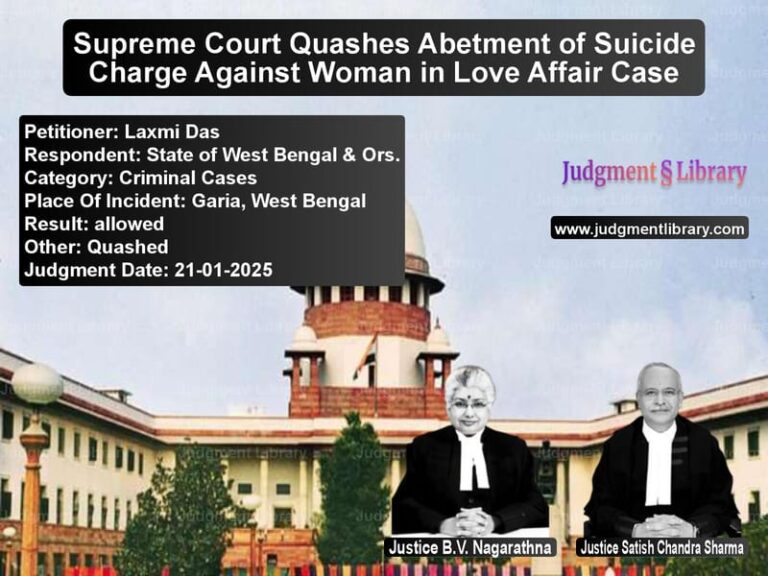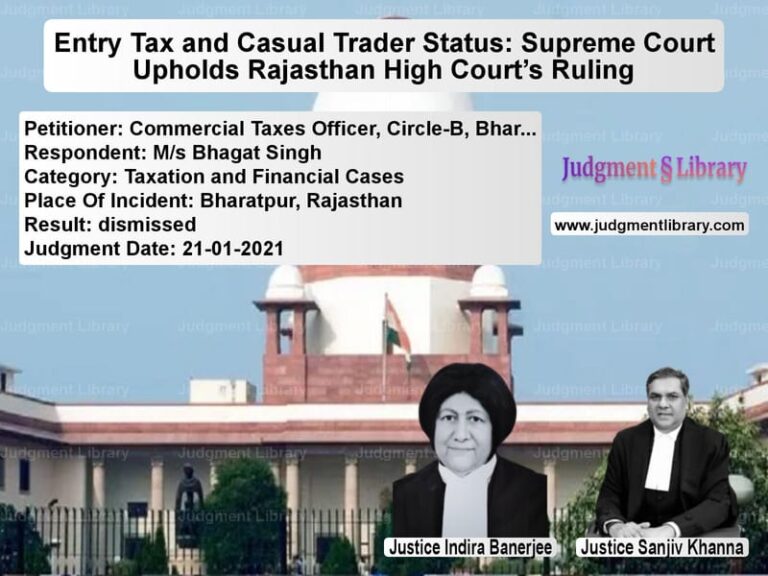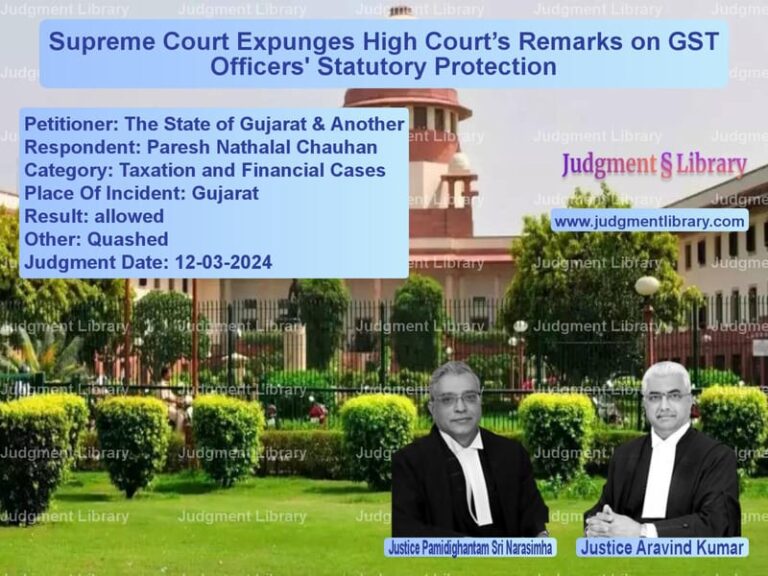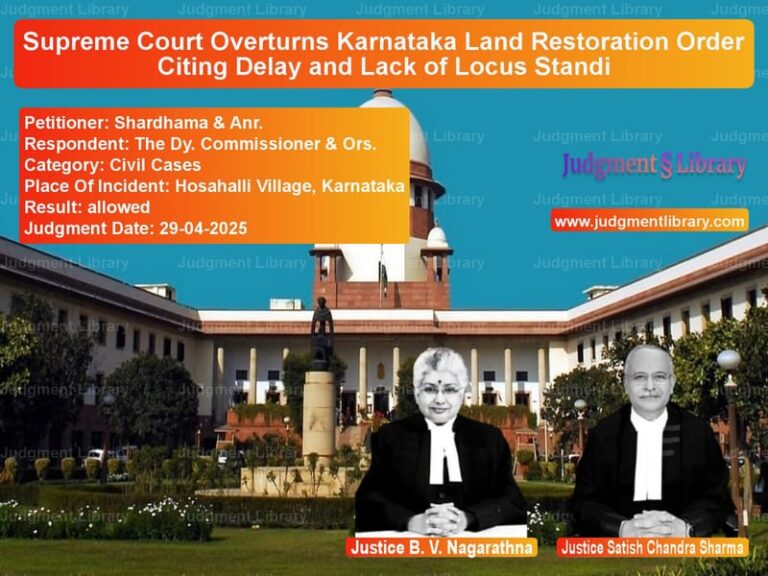University Teachers’ Pay Dispute: Supreme Court Upholds Advance Increments for Ph.D. Holders
The Supreme Court of India, in the case of Sree Sankaracharya University of Sanskrit & Ors. vs. Dr. Manu & Anr., addressed a significant dispute regarding the entitlement of university teachers to advance increments upon placement in the Selection Grade. The Court upheld the judgment of the Kerala High Court, confirming that university lecturers who held a Ph.D. at the time of recruitment were eligible for two additional advance increments upon being placed in the Selection Grade, in accordance with the University Grants Commission (UGC) Scheme of 1999.
Background of the Case
Dr. Manu, the respondent, joined Sree Sankaracharya University of Sanskrit as a Lecturer in Hindi on 14th July 1999. Before this, he had served as a Lecturer for over eleven years in another government college. Upon recruitment, he was placed in the Senior Scale and granted four advance increments under Clause 6.16 of the UGC Scheme, 1999, which provided this benefit to lecturers possessing a Ph.D. degree at the time of appointment.
Subsequently, Dr. Manu was placed in the Selection Grade on 14th July 2000, with a notional date of placement from 22nd December 1999. However, while fixing his revised pay, the university denied him two additional advance increments that were supposed to be granted under Clause 6.18 of the UGC Scheme.
Legal Challenge
Dr. Manu challenged this decision before the Kerala High Court through a writ petition, seeking:
- Quashing of the university’s order that denied him the increments.
- A directive to the university to grant the two additional increments as per Clause 6.18.
- Disbursement of salary arrears from the date of his placement in Selection Grade.
The university defended its decision by citing a subsequent Government Order (GO) issued on 29th March 2001, which stated that teachers who had already received advance increments for possessing a Ph.D. would not be eligible for additional increments when placed in the Selection Grade.
High Court’s Findings
The Kerala High Court ruled in favor of Dr. Manu, holding that:
- The GO dated 29th March 2001 could not have retrospective effect unless explicitly stated.
- Since Dr. Manu was placed in the Selection Grade on 22nd December 1999, before the GO was issued, he was entitled to the two additional increments.
- University teachers who met the eligibility criteria before the GO’s issuance could not be denied their rightful benefits.
Aggrieved by this decision, the university filed an appeal before the Supreme Court.
Arguments Before the Supreme Court
Petitioner’s (University’s) Arguments
The university, represented by Senior Counsel P.V. Surendranath, argued that:
- Clause 6.16 of the UGC Scheme provided a maximum of four advance increments for Ph.D. holders at the time of recruitment, which was the only benefit intended.
- Clause 6.18 should not be read as allowing a double benefit for Ph.D. holders.
- The GO dated 29th March 2001 was a clarification, not an amendment, and should apply retrospectively to deny further increments.
- The university had implemented the government’s directive correctly, and the High Court erred in ruling otherwise.
Respondent’s (Dr. Manu’s) Arguments
Dr. Manu, represented by Senior Counsel Raghenth Basant, countered that:
- The UGC Scheme of 1999 clearly provided for two separate benefits—four increments at recruitment and two more upon placement in the Selection Grade.
- The 2001 GO altered the rules and could not take away vested rights retrospectively.
- The High Court correctly interpreted the scheme and ensured fairness in its implementation.
Supreme Court’s Observations
The Supreme Court examined the relevant UGC Scheme provisions and government orders. Key observations included:
Legislative Intent of the UGC Scheme
- The scheme aimed to incentivize Ph.D. qualification both at recruitment and career progression stages.
- Clause 6.18 explicitly provided for additional increments at the time of placement in the Selection Grade, independent of the benefits under Clause 6.16.
Retrospective Application of the 2001 Government Order
- The GO dated 29th March 2001 substantively altered the benefit structure, reducing the total increments from six to four.
- Since the GO did not expressly state that it would operate retrospectively, it could not take away vested rights.
- Applying the GO retrospectively would unfairly affect teachers who were already placed in Selection Grade before its issuance.
Judicial Precedents Considered
- The Court cited Ex-Capt. K.C. Arora vs. State of Haryana (1984), which held that amendments affecting substantive rights cannot be presumed to operate retrospectively unless expressly stated.
- It also referred to Zile Singh vs. State of Haryana (2004) and Commissioner of Income Tax vs. Gold Coin Health Food Pvt. Ltd. (2008), reinforcing that retrospective application must be clearly intended by the legislature.
Final Judgment
The Supreme Court upheld the High Court’s decision and ruled that:
- Dr. Manu was entitled to two additional increments upon placement in the Selection Grade.
- The GO dated 29th March 2001 was not retrospective and could not deny benefits that had already accrued.
- The university must process salary arrears accordingly.
- The appeal was dismissed, with each party bearing its own costs.
Key Takeaways
- Protection of Vested Rights: Benefits already accrued under an earlier policy cannot be withdrawn retroactively.
- UGC Scheme Interpretation: The ruling clarifies that incentives for Ph.D. holders apply at different stages—recruitment and career progression.
- Limitations on Government Orders: Changes in policy cannot arbitrarily reduce employee benefits unless explicitly stated.
- Judicial Review of Administrative Decisions: Courts can intervene when government orders violate principles of fairness and non-retroactivity.
Conclusion
This landmark ruling affirms the importance of upholding the financial rights of university faculty and ensuring that administrative decisions do not unfairly strip employees of their due benefits. By preventing retrospective application of new government orders, the Supreme Court has set a strong precedent for safeguarding the legitimate expectations of public sector employees.
Petitioner Name: Sree Sankaracharya University of Sanskrit & Ors..Respondent Name: Dr. Manu & Anr..Judgment By: Justice K.M. Joseph, Justice B.V. Nagarathna.Place Of Incident: Kerala.Judgment Date: 16-05-2023.
Don’t miss out on the full details! Download the complete judgment in PDF format below and gain valuable insights instantly!
Download Judgment: sree-sankaracharya-u-vs-dr.-manu-&-anr.-supreme-court-of-india-judgment-dated-16-05-2023.pdf
Directly Download Judgment: Directly download this Judgment
See all petitions in Pension and Gratuity
See all petitions in Promotion Cases
See all petitions in Recruitment Policies
See all petitions in Public Sector Employees
See all petitions in Judgment by K.M. Joseph
See all petitions in Judgment by B.V. Nagarathna
See all petitions in dismissed
See all petitions in supreme court of India judgments May 2023
See all petitions in 2023 judgments
See all posts in Service Matters Category
See all allowed petitions in Service Matters Category
See all Dismissed petitions in Service Matters Category
See all partially allowed petitions in Service Matters Category

